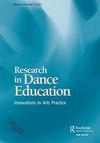“Kola nga bwoyiga ate oyige nga bwokola”:在新冠肺炎大流行期间,在技术不太先进的非洲环境中指导舞蹈教学
IF 0.8
3区 艺术学
0 DANCE
引用次数: 0
摘要
2019冠状病毒病大流行影响了非洲社区的舞蹈实践,当时非洲社区仍在努力建设技术基础设施和资源,以推进舞蹈教育、研究、奖学金和实践。在2019冠状病毒病大流行期间,乌干达等非洲国家信息和通信技术(ICT)基础设施欠发达环境中的舞蹈教师和学生是如何进行在线舞蹈教学的?本文以基干达教育理念“边学边做”(kola nga bwoyiga ate oyige nga bwokola)为分析框架,揭示乌干达舞蹈教师和学生在疫情期间如何运用舞蹈教学方法。师生们的反思揭示了疫情如何瓦解了社区意识,这是当地社区的一种真正的本质舞蹈。疫情引发了对在线和远程舞蹈教学框架、应用以情境为中心和技术响应的教学法以及使用电影工具教授土著舞蹈传统的彻底反思。讨论揭示了“kola nga bwoyiga ate oige nga bwokola”如何以教学想象和策略为中心,激活能动性、适应性、弹性和情境化,强调了土著世界观在克服舞蹈教育中不断出现的障碍方面的价值和相关性。本文章由计算机程序翻译,如有差异,请以英文原文为准。
‘Kola nga bwoyiga ate oyige nga bwokola’: navigating dance pedagogies in technologically less advanced African environments during the COVID-19 pandemic
The Covid-19 pandemic impacted dance practice in African communities, which at the time were still grappling with building technological infrastructure and resources to advance dance education, research, scholarship, and practice. How did the dance teachers and students in environments with less developed information and communication technological (ICT) infrastructure in African countries such as Uganda navigate online teaching and learning of dance during the covid-19 pandemic? This article engages the Kiganda education philosophy 'kola nga bwoyiga ate oyige nga bwokola' (learn as you do and do as you learn) as an analytical frame to unpack how the dance teachers and students in Uganda navigated dance pedagogies during the pandemic. The reflections of the teachers and students revealed how the pandemic dismantled the sense of community as an actual essence dance in local communities. The pandemic stirred a radical rethink on framing online and distance dance teaching and learning, applying context-centered and technologically-responsive pedagogies, and using motion picture tools to teach indigenous dance traditions. The discussion unpacks how 'kola nga bwoyiga ate oyige nga bwokola' centered pedagogic reimaginations and maneuvers to activate agency, adaptation, resilience, and contextualization, underscoring the value and relevance of Indigenous worldviews in overcoming ever-emerging barriers in dance education.
求助全文
通过发布文献求助,成功后即可免费获取论文全文。
去求助
来源期刊

Research in Dance Education
DANCE-
CiteScore
2.50
自引率
30.00%
发文量
35
期刊介绍:
Research in Dance Education aims to inform, stimulate lively and critical debate and promote the development of high quality research and practice in dance education. The journal is relevant to dance academics, teachers and learners. The journal includes contributors from a wide and diverse, international community of researchers. This extends to all aspects of dance in education, providing opportunities for both experienced and less experienced researchers. The journal encourages a wide range of research approaches and methods, in a forum for debate. Issues related to pedagogy, philosophy, sociology and methodology in relation to creating, performing and viewing dance in various contexts are welcome. The role and value of dance as part of arts education and the connections with other arts practitioners is also supported. The research field of Research in Dance Education includes for example: all phases of education, pre-school to higher education and beyond; teaching and learning in dance, theory and practice; embodiment; new technologies; systematic reviews of literature; professional dance artists in education; learning in and through dance; aesthetic and artistic education; dance and the arts; dance and physical education; training dance teachers: initial teacher education, continuing professional development, dance degrees, and professional dance training; examination dance; dance therapy; special educational needs; community dance and youth dance; dance in society: gender, ethnicity, class, religion, economics; psychological issues: self esteem, motivation, body image; creativity; philosophy and the arts; research methods and methodologies.
 求助内容:
求助内容: 应助结果提醒方式:
应助结果提醒方式:


